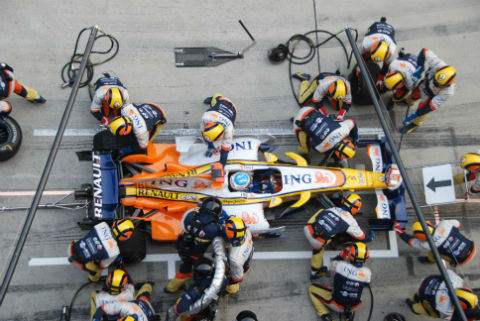
In the inaugural season of Formula One in 1950, a pit stop involved four mechanics and took over a minute to complete.
Now, with a crew of around 20 mechanics, an F1 pit stop can last just two seconds.
That makes all the difference when you’re travelling at 200 mph.
High-performance teams don’t just happen; they’re made.
A team is more than the sum of its parts
Analysing every F1 driver in every race between 1981 and 2010, research led by Cass Business School found that individual performance was worse in teams with two top ranking drivers.
Put simply, if you hire too many high fliers, your team will soar too close to the sun.
A high performance team is about more than the sum of its parts. To build a successful team that collaborates effectively and works toward the same goal as efficiently as possible, you need to find people who click and whose skill sets complement each other. And that’s as much about the hunch as the data.
Thoughtlessly poaching top talent from other companies or packing your team with stars will just leave you with a poorly performing group, riven by petty office politics.
Intelligence comes not from the head, but the heart
Similarly, there is no correlation between a higher number of high IQ individuals in a team and its success, according to researchers at MIT.
They found, instead, that the smartest teams were those with members who were better at reading others’ emotions. This was just as important for remote teams as it was for those who work face to face.
And, because women were found to be better at reading emotions than men, the teams with the highest number of women were the most successful.
Effective communication is crucial
Good communication is, of course, vital to any high performing team, but it’s not what you communicate that’s most important, but how you communicate it.
Measuring the social dynamics of 2,500 business people over seven years, MIT’s Human Dynamics Laboratory found that the most successful teams share the following elements:
- Rather than one or two dominating, everyone in the team talks and listens in about equal measure, keeping their contributions short and sweet.
- Members face one another and their conversations and gestures are positive, confident and energetic.
- Members have backchannel or side conversations within the team and speak to each other direct – not just with, or through, their team leader.
- Members seek advice outside the team and bring information and insights back.
Learn to love your managers
In a company ‘built by engineers for engineers’, Google started wondering if managers were ‘more destructive than beneficial’, according to an article in Harvard Business Review. The data proved that they were wrong.
Teams with good managers saw a lower churn rate and reported greater satisfaction in levels of innovation, work-life balance and career development.
But the best leaders weren’t micromanagers; they inspired and coached, and then got out of the way, trusting their team to get on with the job.
Conflict resolution is a valuable skill
In top performing teams, peers, rather than the team leader, manage problems between one another, says social scientist Joseph Grenny.
When individuals can confront issues in the team quickly, firmly and respectfully, it allows the manager to stop being playground monitor and focus on leading the team to success.
Get the help you need
Coaching and training in communications skills can help teams improve their performance. It can help your team attain all of the habits of high performance teams covered in this article: integrating stars, developing managers, cultivating emotional intelligence, resolving conflict and improving team communications. Contact us if you’d like to explore any of these issues.
